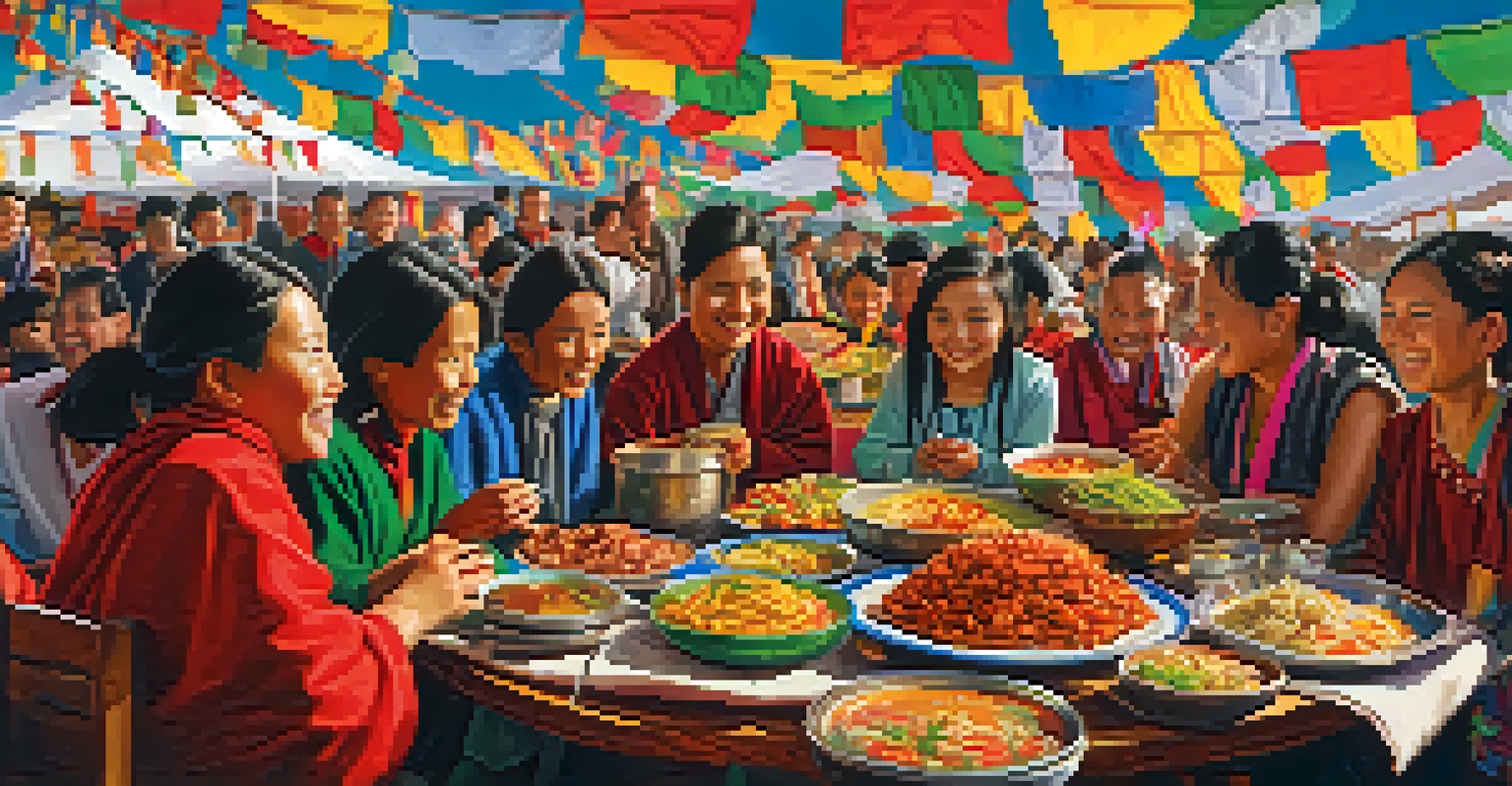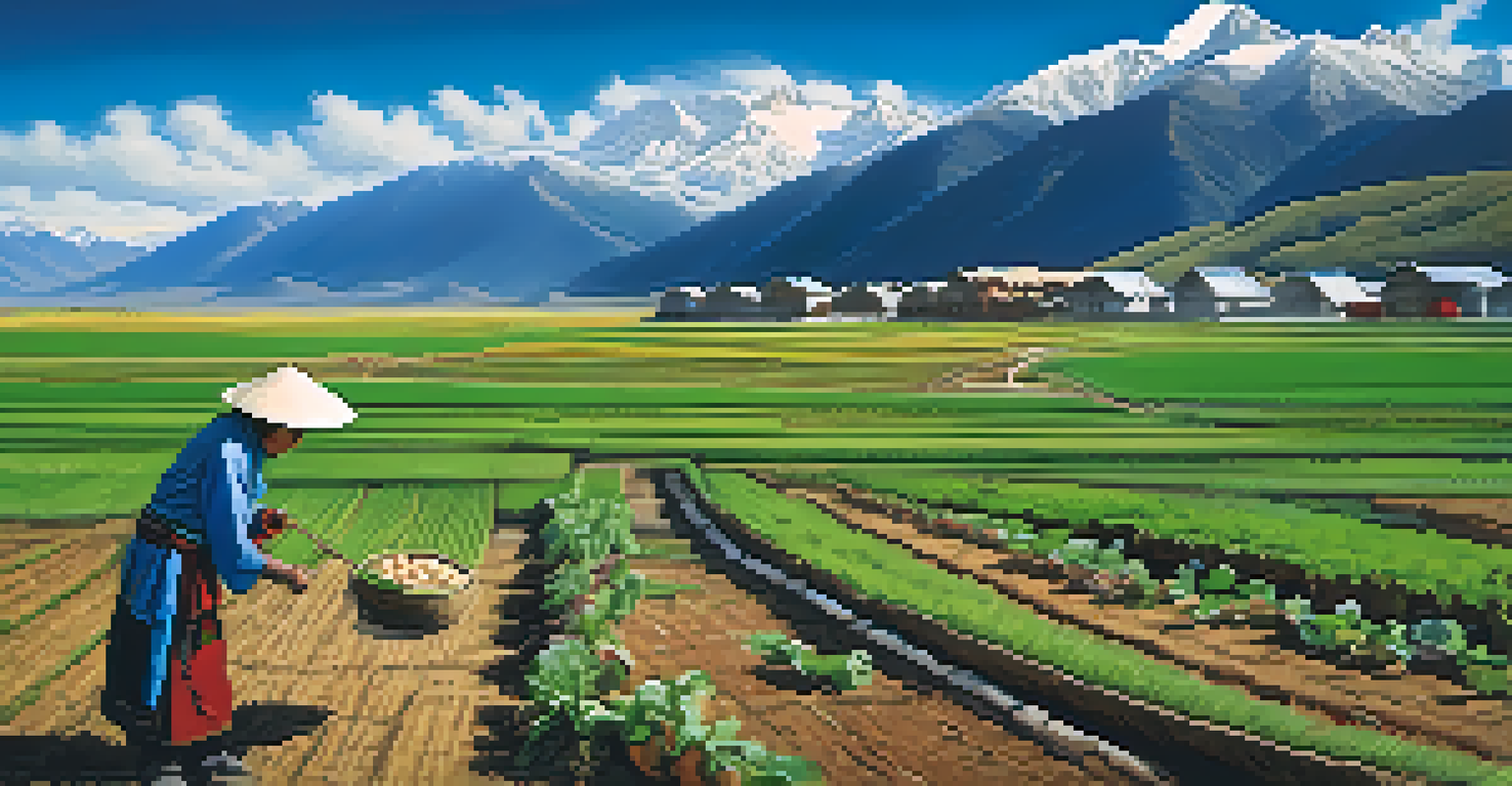The Role of Vegetarianism in Tibetan Cultural Practices

Understanding Tibetan Buddhism and Its Dietary Practices
Tibetan Buddhism plays a crucial role in shaping the dietary habits of Tibetans. At its core, this spiritual tradition emphasizes compassion towards all living beings, which has influenced many to adopt a vegetarian lifestyle. The belief that taking life disrupts one's karma encourages followers to choose plant-based diets, aligning their eating habits with their spiritual values.
Vegetarianism is a way of life that reflects our commitment to compassion and respect for all living beings.
Moreover, the concept of 'ahimsa' or non-violence is central to many Tibetan Buddhist teachings. This principle extends beyond just avoiding harm through actions; it also encompasses the food one consumes. Thus, many Tibetans view vegetarianism not just as a dietary choice but as a moral imperative that reflects their commitment to peace and compassion.
In many Tibetan communities, special occasions and religious festivals often feature vegetarian dishes, showcasing the cultural significance of this practice. These meals not only nourish the body but also the spirit, reinforcing the connection between food, spirituality, and community.
The Impact of Geography on Tibetan Diet
The harsh geography of Tibet significantly influences its food culture, including the practice of vegetarianism. Due to the high altitude and rugged terrain, agriculture is challenging, leading to a reliance on hardy crops. While meat is a part of the traditional diet, many communities are turning to vegetarianism as a sustainable alternative that respects their environment.

Additionally, the limited access to fresh produce in remote areas means that many Tibetan diets are naturally inclined toward vegetarianism during certain seasons. Root vegetables, grains, and legumes become staples, allowing for a diverse range of plant-based meals. This adaptability showcases how Tibetan culture harmonizes dietary practices with the surrounding environment.
Compassion Drives Vegetarianism
Tibetan Buddhism emphasizes compassion and non-violence, leading many followers to adopt vegetarian diets as a reflection of their spiritual values.
As global awareness around sustainable eating grows, more Tibetans are embracing vegetarianism, viewing it as a way to protect their fragile ecosystem. This shift highlights not only the cultural resilience of Tibetans but also their commitment to environmental stewardship.
Vegetarianism in Tibetan Monastic Life
In Tibetan monasteries, vegetarianism is a common practice deeply rooted in religious beliefs. Monks often adhere to strict vegetarian diets, reflecting their dedication to the principles of non-violence and compassion. Their meals typically consist of simple, wholesome ingredients, emphasizing the idea that food should nourish both the body and the spirit.
Eating is an agricultural act, and we must be mindful of the choices we make to ensure sustainability and health.
Monastic kitchens often serve as centers for teaching and preserving traditional vegetarian recipes. These kitchens are not just about sustenance; they are also places of communal bonding and spiritual growth. Through cooking together, monks cultivate a sense of community and reinforce their commitment to their vows.
Furthermore, the influence of monastic vegetarianism extends into lay communities, where many families adopt similar practices. This ripple effect showcases how the choices made within monastic life can shape broader cultural norms and values around food.
Celebrating Festivals with Vegetarian Feasts
Tibetan festivals are vibrant celebrations filled with cultural significance, and vegetarianism plays a vital role in these gatherings. During events like Losar (Tibetan New Year), families prepare elaborate vegetarian dishes that symbolize renewal and prosperity. These meals serve as a reminder of the importance of compassion and community in Tibetan culture.
Traditional recipes often include ingredients that are locally sourced and reflect the rich agricultural heritage of Tibet. Dishes like 'momo' (dumplings) filled with vegetables or 'thukpa' (noodle soup) made with seasonal produce highlight the creativity and resourcefulness of Tibetan cooks. These meals not only satisfy hunger but also foster a sense of togetherness among families and friends.
Geography Shapes Dietary Choices
The harsh Tibetan landscape and limited agricultural options encourage a reliance on plant-based foods, making vegetarianism a practical and sustainable choice.
The focus on vegetarian food during festivals underscores a collective commitment to values that transcend mere dietary choices. It reinforces the idea that food is a medium for expressing love, gratitude, and cultural identity.
The Role of Traditional Medicine in Dietary Choices
Traditional Tibetan medicine, or Sowa Rigpa, emphasizes the balance of body, mind, and spirit, and diet plays a crucial role in this holistic approach. Many practitioners advocate for vegetarianism as a means to maintain good health and promote well-being. The belief is that plant-based foods are easier to digest and provide the body with vital nutrients without the heaviness of meat.
Herbal remedies and dietary guidelines often recommend vegetarian options for specific ailments, further embedding these practices into Tibetan culture. For example, certain vegetables are thought to possess healing properties that can help cleanse the body and enhance vitality. This connection between diet and health reinforces the idea that what we eat directly impacts our overall wellness.
As more people become aware of the health benefits associated with vegetarianism, there is a growing trend in Tibetan communities to adopt plant-based diets for both health and ethical reasons. This shift illustrates how traditional practices can evolve while still honoring cultural roots.
Modern Influences on Tibetan Vegetarianism
In recent years, globalization and increased access to information have led to new influences on Tibetan dietary practices, including vegetarianism. Younger generations, exposed to global vegetarian movements, are increasingly seeking plant-based diets that align with their values. This shift reflects a broader trend of combining traditional practices with contemporary lifestyles.
Social media plays a significant role in this transformation, as it allows for the sharing of vegetarian recipes and stories that resonate with a wider audience. Tibetan food bloggers and chefs are using these platforms to showcase how traditional dishes can be adapted to fit modern vegetarian diets, bridging the gap between past and present.
Modern Trends Influence Tradition
Globalization and social media are inspiring younger Tibetans to embrace vegetarianism, blending traditional practices with contemporary dietary preferences.
This evolution of vegetarianism in Tibetan culture highlights a dynamic interplay between tradition and innovation. While rooted in ancient beliefs, the practice continues to adapt, ensuring its relevance in today's world.
Conclusion: The Future of Vegetarianism in Tibetan Culture
As we look towards the future, the role of vegetarianism in Tibetan culture appears poised for further growth. With increasing awareness around health, sustainability, and compassion, more Tibetans are likely to embrace plant-based diets. This evolution reflects not only personal choices but also a collective movement towards a more ethical and environmentally conscious lifestyle.
The interplay between tradition and modernity will continue to shape how vegetarianism is practiced and understood within Tibetan communities. As younger generations seek to honor their heritage while adapting to contemporary challenges, vegetarianism offers a meaningful way to connect with both their culture and the world around them.

Ultimately, the future of vegetarianism in Tibetan culture represents a beautiful fusion of faith, health, and sustainability, ensuring that these values remain integral to the Tibetan way of life for generations to come.